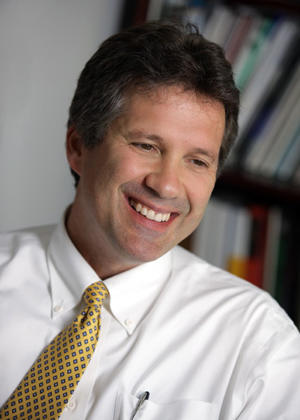Grantee Spotlight: Bill Nelson, M.D., Ph.D. - Steering a Partnership to Improve Cancer Outcomes for African Americans in Maryland and DC
, by CRCHD staff
Dr. William (Bill) Nelson is playing an integral role in advancing our understanding of cancer health disparities and helping to foster the interests of young medical and science students from underrepresented backgrounds in the field of cancer and cancer health disparities research. Dr. Nelson, Director of the Sidney Kimmel Comprehensive Cancer Center at the Johns Hopkins University and a Professor of Oncology, Urology, Pharmacology, Medicine, Pathology and Radiation Oncology, specializes in the treatment and research of prostate cancer.
Dr. Nelson steers one of the NCI-supported Comprehensive Partnerships to Advance Cancer Health Equity (CPACHE), a partnership between the Howard University Cancer Center and Sidney Kimmel Comprehensive Cancer Center. The Howard-Hopkins partnership aims to increase screening, diagnosis, prevention, treatment, and care in African Americans residing in the Baltimore, Maryland and Washington, District of Columbia region. In this geographic area, African Americans continue to have the highest cancer death rates in the United States (and have held this statistic for more than fifty years).
“The goal of the Howard-Hopkins partnership is to eliminate cancer health disparities by focusing on the causes, molecular biology, and genetics of cancer in African Americans. By working closely with Howard University, and with Dr. Lucile Adams Campbell there, we hope to deliver solutions to the underserved populations in the Baltimore/Washington area,” Nelson said.
Results from the Howard-Hopkins partnership have been promising. Since its launch more than a decade ago, minority accrual to clinical trials has improved, Dr. Nelson reported, “The overall cancer mortality rate for African-Americans has declined by 14.9% from 2000-2008. Similarly, during 2005-2009, cancer mortality in African-Americans reduced overall by 2.4%” -- the first time the mortality decline was greater than that observed in non-Hispanic Whites (1.4%).
Through a cooperative agreement with Sibley Hospital in Washington, DC, there are now four hospitals in the Baltimore/DC area who are offering quality cancer care to previously undeserved population groups. But, more work needs to be done to effectively address cancer health disparities in our region, reports Dr. Nelson. The current initiatives in the Howard-Hopkins partnership include a Phase II clinical randomized trial to see if a diabetic drug, metformin, can improve cancer outcomes of elderly African Americans. NCI is also funding additional trials to identify early interventions of several types of cancers, including colorectal, prostate, endometrial, and breast cancer.
Additionally, the Howard-Hopkins partnership has helped train approximately 87 pre-and post-graduate students, as well as medical students for the laboratory and patient care settings. Both Howard University and Johns Hopkins University have also begun offering seminar programs focused on health disparities. Through the partnership, 36 students have earned Ph.D. degrees, a dozen currently hold university faculty positions, 13 are in clinical practice, and 11 are government/foundation scientists. Moreover, the partnership has produced more than 263 scientific papers and more than 3,000 citations stemming from the partnership’s work.
“We have seen great results from the Howard-Hopkins partnership, but we want to rid the cancer health disparity among African Americans in our area,” Dr. Nelson said. “It’s equally important to get young science scholars and cancer researchers involved, and that’s what this partnership allows us to do.”
Resources:
- Learn more about CRCHD’s PACHE program
- Learn more about the Howard-Hopkins partnership
